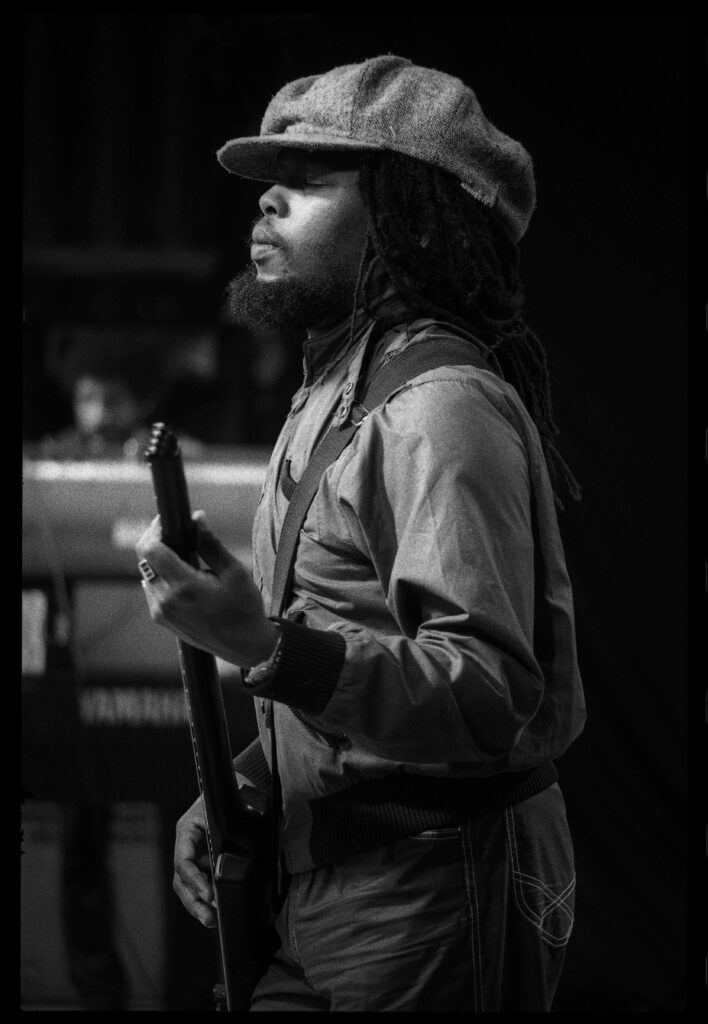UNITED KINGDOM - JUNE 18: GLASTONBURY FESTIVAL Photo of Robbie SHAKESPEARE and SLY & ROBBIE, Robbie Shakespeare backstage at the festival (Photo by David Corio/Redferns)
I am Robbie Shakespeare, the other half of Sly Dunbar. You have Sly and Robbie, I am the Robbie.
Robbie Shakespeare to GM, Evenstad Music
In “dubs”, as night-long reggae parties were called in some of South Africa’s townships, you would hardly hear tracks by reggae royalty like Bob Marley or Peter Tosh. The reason for that was simple; their records didn’t “dub”, as the dreads complained.
But while Robbie Shakespeare and Sly Dunbar had plenty of contact with the Wailers’ stars (Shakespeare played bass on Concrete Jungle and the pair basically produced Peter Tosh albums like Equal Rights, Bush Doctor and Wanted Dread and Alive), it is the dubwise grooves they honed for the likes of Black Uhuru that resonated with ghetto youths worldwide.
By the time we get to the popping syndrum sounds heard on records like Black Uhuru’s Sinsemilla album, the duo were basically operating as a human dub machine that put their own twist to the steady diet of diasporic sounds and, in due time, transported reggae beyond its insular confines. With Dunbar’s penchant for programming toys, and Shakespeare’s stoic aversion to belabouring a point, the two perfected a lean template that basically met the digitisation of dancehall halfway.
As Jeff Chang writes in his book Can’t Stop Won’t Stop: A History of the Hip-Hop Generation, the dub side of the track, coming on the heels of Jamaica’s independence, was born by mistake. It was the unofficial version, the people’s choice, “the sound of a fragmenting nation, troubling, strange, tragic, wise slow-motion portraits of social collapse”.
Reflecting on it now, the youths of Cold War Jamaica, drenched in the blood and bullets of garrison towns, shared much in common with the youths of the new nation of South Africa, draped as we were in the fresh scars of democracy, weighed down by the cross of reconciliation.
Some of us, too, had seen the unspeakable; the procession of lives unaccounted for in the balance sheet of liberation. In the endless permutations of the Riddim Twins’ interplay, we saw premonitions of a country that would never be. In the night of Shakespeare’s concise basslines, hope itself vanished into mist. Michael Rose’s cry of “Don’t show I your teeth, plastic smile can’t work” (in the Black Uhuru song Plastic Smile) often echoed into hills and into the void. As sure as the vibes were pristine, the future itself was dread.
As Louis Chude-Sokei writes in Dr Satan’s Echo Chamber (in Chimurenga 12 and 13), “This moment of trance, when the bass, vocals and melodies drop out leaving the pure, non-narrative break, is a moment of dub, a moment of existential dread.”
As such, the dubs were also spaces of remaking, of precious, fleeting communion, of ecstasy and letting go. Sly and Robbie’s experiments in rhythm were nothing if not invocations to dance; a gun salute of patterns assaulting the marrow.
“When I was doing the dub thing, I was watching a film and they were just beating the shakers and dancing, so I thought there must be a way we can get people dancing in reggae just to drum and bass,” said Dunbar in a 2008 Red Bull Music Academy lecture in Barcelona. “Robbie and myself started working, playing patterns and changing stuff, and it worked – you could have the drum and bass playing all the way through with nothing else.”
For the dubmasters of the 80s (and to a small extent the 90s) in parts of South Africa, the very act of being in possession of reggae music, let alone the gall of disseminating it, were acts of subversion, sometimes punishable by streetside humiliation or even prison. As one dread recently put it, to play Peter Tosh’s Equal Rights (the crown jewel of the Riddim Twins’ collaborations with the Stepping Razor) at home or in public on a boombox as was the culture of the day, was an invitation for a zealous policeman to crush your cassette tape and destroy your boombox as an example.
 UNITED KINGDOM – JUNE 18: GLASTONBURY FESTIVAL Photo of Robbie SHAKESPEARE and SLY & ROBBIE, Robbie Shakespeare on stage at Glastonbury (Photo by David Corio/Redferns)
UNITED KINGDOM – JUNE 18: GLASTONBURY FESTIVAL Photo of Robbie SHAKESPEARE and SLY & ROBBIE, Robbie Shakespeare on stage at Glastonbury (Photo by David Corio/Redferns)
In an age before the Rasta movement in KwaZulu-Natal became a murky pit of competing doctrines and ascetic upmanship, dubs served as an egalitarian form of recruitment and reasoning. A way of upsetting the set up, of disturbing the peace. It was bass as a reclamation of space at a time when the wounds of being hunted down by warlords and their henchmen were still bearing raw flesh. In those confusion and exhilaration of the moment, the sonic terrain became the new battlefield.
As each staccato bassline blended into the next, rattling rib cages and windows alike, soon enough they all seemed to be the handiwork of one man. To most of us who observed Robbie Shakespeare from a distance, it seemed to be the only way he spoke.